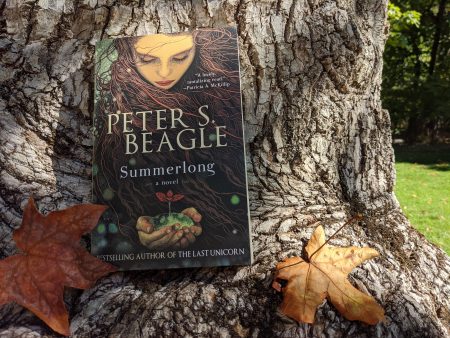
Callum Quinn, © 2019
Summerlong
By Peter S. Beagle
The (a) story follows Joanna, Abe, and Lily: three people busy leading their quiet, normal lives off Puget Sound as a bitter winter nears its end. Though feeling a bit past their prime, Abe and Joanna have found solace in their long-term relationship, while Joanna’s daughter Lily seems to remain forever luckless in love. But even as their lives bear slight undertones of discontent, the three have managed to hold themselves together within their own unconventional family unit.
Then one night a beautiful and mysterious woman named Lioness enters their lives, and even the foggy Puget Sound winter seems to leap into spring upon her arrival. And as several warm and prosperous months pass, Lioness seems to weave a strand of magic through their lives—a magic that encourages them to pursue their passions and walk new paths.
But Lioness’s days in the sun are numbered, and a dark past is waiting to catch up to her.
The (A) story is about love in its many forms. We can see this quite clearly through Joanna and Abe, who have been together since Lily was a child. Though they remain unmarried, they share in the comforts of a married life: home-cooked meals, quiet evenings in with a movie, light conversation on the back steps, and regular trips to their favorite restaurant. At this point in their lives they have found familiarity with each other and with their routine.
Lily, unfortunately, has been through a string of partners who have not treated her right. However, this changes with Lioness, who gently rejects Lily’s advances while still showing her a kindness and consideration she has never been shown before. Throughout the book, we watch as Lioness’s love helps transform Lily and her relationships—not just with romantic partners, but with Abe and her mother.
Because of this particular transformation that Lily goes through, prompting her need to develop closer bonds with the people who do love her, we can say that the story is also about the love between mothers and daughters. Specifically, it explores a type of helplessness that mothers may feel when their daughters grow up and go out into the world—especially a world full of potential lovers. Joanna knows Lily’s relationships have been sour, but aside from she and Abe telling Lily she deserves better, there is nothing that can be done; Lily is an adult, and has to make her own mistakes. This sense of helplessness is on an even harsher side for Lioness and her own mother, who are caught up in a complicated web of love and loss.
Loss, in fact, is another theme represented within this story. Particularly, Summerlong explores a loss of individuality. We see this through Abe and Joanna, who have found comfort in the familiar, even as deep down they wish to explore avenues that would ultimately exclude each other. But we mostly see this loss of individuality through Lioness, who is running from something unnamed throughout most of the book. It is only once we learn the truth that we realize she is trying desperately to grasp at her own freedom and sense of self.
In the end, however, each character within Summerlong must also learn to adapt to this sense of loss. Abe and Joanna must find a way to move on from their comfortable family unit as they pursue other interests and ultimately make mistakes that are too awful to ignore; Lily must learn to be kind to and love herself when Lioness can no longer be there for her, and Lioness must sacrifice the greater part of her individuality for the sake of a bigger picture that the trio could never fully understand.
And within these adjustments there is also an underlying theme of forgiveness, and, for some, the inability to forgive. We see this with Abe and Joanna, but this theme is more fully explored with one particular character who has “done only one thing for which [they] wish to be forgiven. And [they] never can be.”
I’m being somewhat vague with details because the twist in this book is just so great that I do not want to spoil it for you. If you share my enthusiasm for a particular genre of storytelling (that I won’t name, because that would be too big a hint), then you will be able to piece the truth together partway through—and once you do, it will come as a delightful and touching surprise.
Summerlong is a slow, soft read—perfect for those last few days in the sun before the fall season truly begins to set in. The themes are subtly woven into the prose in a way that makes you feel part of the experience, as if you are witnessing a slice of life in all its beauty and chaos, and not reading a fantasy. If anything, the themes might be a little too subtle; hard to find unless you’re really grasping for them. It makes me wish Beagle had chosen one main theme to spread a little further throughout the book, instead of throwing hints at several different ones here and there.
However, I also get the impression that this is the type of book that unearths more details the second or third time through. It is possible I overlooked some of the deeper hints and meanings with this first read. But Summerlong is worth taking a closer look—if not for the calming nature of a story that takes you from the summer heat and into the soft chill of fall, then for the bitter-sweetness of recognizing your place in the grander scheme of things.





